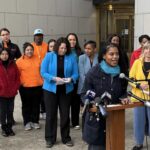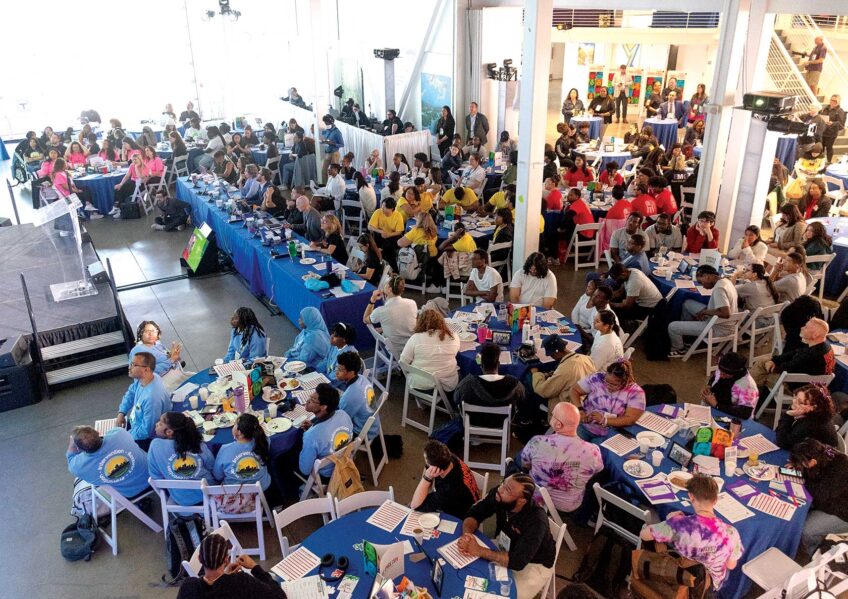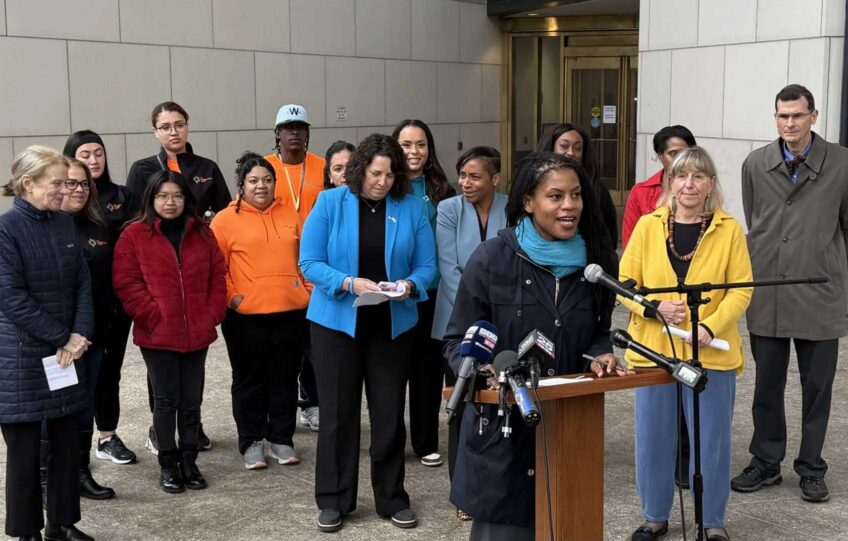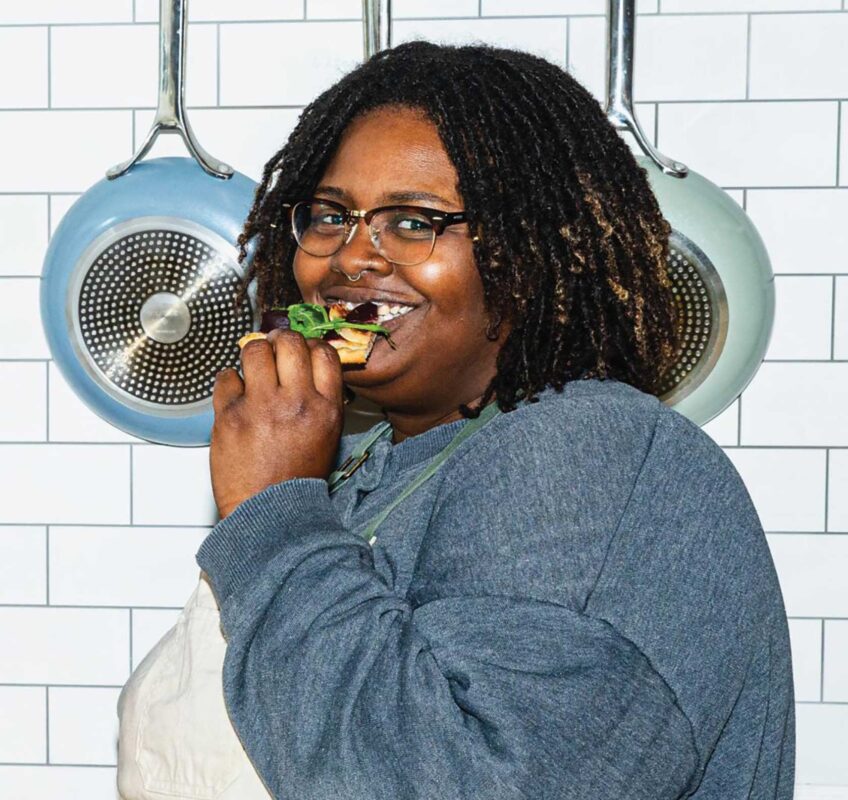City Council candidates gather at Roxbury forum
Differences in positions on housing, education
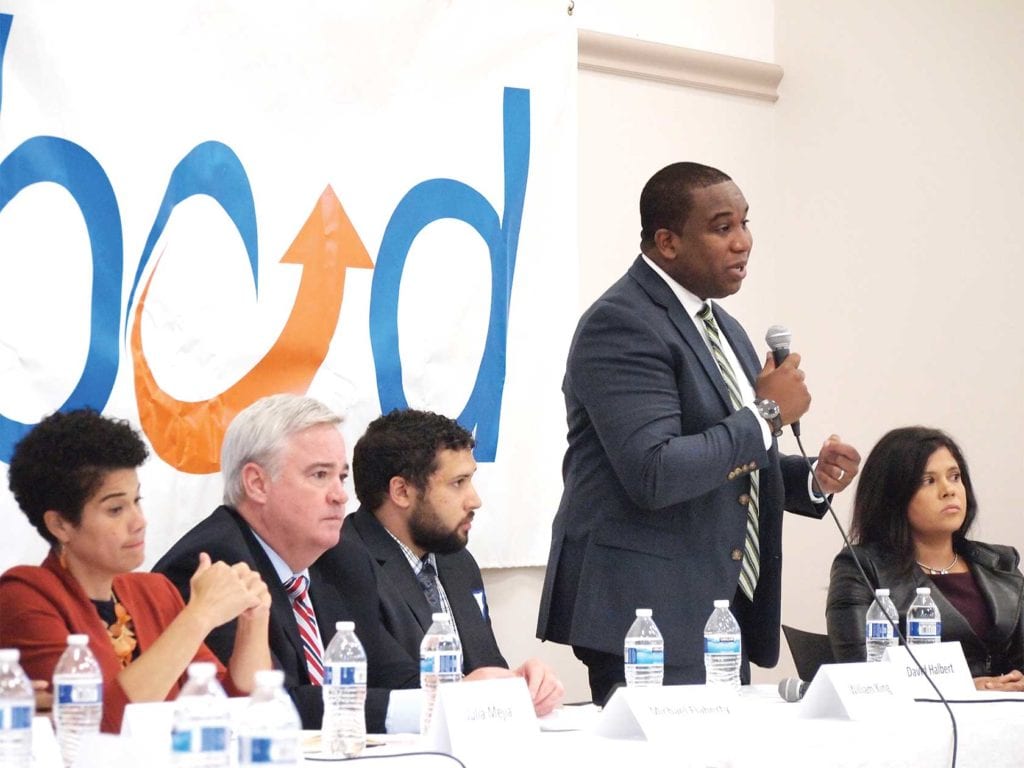
All 12 candidates for at-large seats on the City Council who turned out for a forum at ABCD’s Thelma Burns Building in Grove Hall last Thursday said they would support measures to ensure a greater share of jobs and contracts in the city of Boston go to people of color and women. They were all in agreement about the need more funding for bilingual education and rent subsidies.
On rent control, however, a split between incumbents and challengers emerged.
The challengers vying for the four citywide seats expressed unequivocal support for rent control.

At-large candidates Alejandra St. Guillen, Michelle Wu, Priscilla Flynt-Banks and Domingos DaRosa. BANNER PHOTO
“I’ve knocked doors across the city and the number one issue I heard about is housing affordability,” said Alejandra St. Guillen.
“I support rent control because I am a renter,” said Michel Denis.
The incumbents?
“Not at this time,” said Michael Flaherty. “But I would not take it off the table.”
Annissa Essaibi-George said rent control would hurt owners of two- and three-family homes.
“We have seen when rent control is in place, it only benefits large property owners who know how to work the system,” she said.
Of the three incumbent councilors who showed up, Michelle Wu gave the most nuanced answer.
“I fully support overturning the statewide ban on rent control so cities like Boston can have the conversation,” she said. “We need more affordable housing.”
Missing from the forum were incumbent Althea Garrison and challengers Martin Keogh and Erin Murphy.

The audience at last week’s at-large city council debate filled the Thelma Burns auditorium at ABCD’s Grove Hall site. BANNER PHOTO
With a growing percentage of “rent-burdened” households in the city, in which people are paying upwards of 50 percent of their income on rent, housing affordability is one of the most widely discussed topics in this year’s council election.
At last week’s forum, some candidates called for increasing the percentage of units required to be set aside as affordable under the city’s inclusionary development policy, which is currently set at 13 percent.
Julia Mejia said she would push for 50 percent of all new housing to be affordable, but offered no insights on how to pay for the additional requirement. William King said percentage should be 22 percent. Herb Lozano called for 20 percent.
Education issues
While housing has been a dominant issue in the campaign, the Boston Coalition for Education Equity has polled candidates on controversial education issues, including the idea of returning to an elected school committee, and published the results. Thirteen of the at-large candidates indicated they would support a return to a body with elected members, with Wu and Essaibi-George saying they wouldn’t. Many said they would support a hybrid model, with at-large candidate David Halbert giving perhaps the most nuanced model:
“Two members appointed by the mayor (with one being the student member, who would remain directly selected by BPS students); two appointed by the City Council, one by the council president and the other being the education chair (or their designee); three directly elected by Boston voters, with new school committee districts corresponding to combinations of City Council districts 1-3, 4-6, & 7-9,” Halbert wrote in his response.
Asked whether they were involved in the Question 2 ballot initiative, incumbent councilors Essaibi-George and Flaherty responded that they had voted for a resolution opposing the measure, which would have lifted the statewide cap on charter schools. Wu said she participated in voter outreach.
Mejia, who at the time of the 2016 question worked for the Massachusetts Charter School Association, but has since distanced herself from the charter movement, explained her previous support.
“After a few years of working in the space and more specifically after Families for Excellent Schools (FES) led the Q 2 effort it became clear that the effort to lift the cap wasn’t about our children but instead a political battle to pit poor black/brown families against each other and further impact our traditional schools,” she wrote in her response.
Alejandra St. Guillen said she voted yes on Question 2 because Latino parents with whom she worked in Lawrence, Holyoke and Springfield felt the schools were the only option for their kids to receive a quality education in their districts.
“This was their reality on the ground and for this reason, I voted ‘yes’ on that ballot question,” St. Guillen wrote. “It was a deeply difficult decision as I understood that it was indeed a flawed question and that would be the reason I could not be actively involved.”
The 15 at-large candidates will appear on the Sept. 24 preliminary ballot, on which voters can cast votes for up to four of them. The eight candidates who receive the highest percentage of votes will advance to the Nov. 5 election. Some district council seats will also appear on the Sept. 24 preliminary ballot, including District 5 in Hyde Park, Roslindale and Mattapan; District 7 in Roxbury, the South End and the Fenway; District 8 in the South End, Back Bay, Beacon Hill and Mission Hill; and District 9 in Allston/Brighton all have contested elections with more than two candidates, forcing preliminary balloting.




